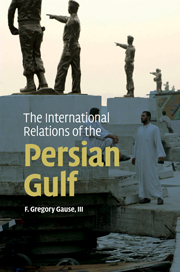Book contents
- Frontmatter
- Contents
- List of maps and tables
- Acknowledgments
- Note on the text and bibliography
- 1 The Persian Gulf as a security region
- 2 The emergence of the Gulf regional system, 1971–1978
- 3 The Iranian Revolution and the Iran–Iraq War
- 4 The Gulf War and the 1990s
- 5 9/11, the Iraq War and the future of the Persian Gulf
- 6 The Iraq War: American decision-making
- 7 Conclusions: war and alliance in the Persian Gulf
- Index
- References
3 - The Iranian Revolution and the Iran–Iraq War
Published online by Cambridge University Press: 05 June 2014
- Frontmatter
- Contents
- List of maps and tables
- Acknowledgments
- Note on the text and bibliography
- 1 The Persian Gulf as a security region
- 2 The emergence of the Gulf regional system, 1971–1978
- 3 The Iranian Revolution and the Iran–Iraq War
- 4 The Gulf War and the 1990s
- 5 9/11, the Iraq War and the future of the Persian Gulf
- 6 The Iraq War: American decision-making
- 7 Conclusions: war and alliance in the Persian Gulf
- Index
- References
Summary
The Iranian Revolution is a pivot of modern Middle Eastern history. It was that rarest of political events – a real social revolution, on a par with the French, Russian and Chinese revolutions. Its impact, like that of its historical counterparts, was not contained by Iran's borders. Among its regional effects, it substantially changed the geopolitics of the Persian Gulf. It destroyed the American–Iranian alliance, one of the “twin pillars” upon which American policy in the region was built. It ushered in a new global oil crisis, with prices nearly doubling between 1978 and 1980. It led directly to the Iran–Iraq War, which was not only a battle for regional dominance but also a struggle over the political future of the area, with revolutionary Islam challenging the status quo of Ba'thist Arab nationalism in Iraq and monarchy in the Gulf states. It made allies out of former enemies – if only for a time – and altered the pattern of regional alignments developed in the 1970s.
The Iran–Iraq War lasted for nearly eight years, costing each side close to 200,000 dead and perhaps twice that number wounded. It left the region poorer by hundreds of billions of dollars in lost oil production, physical destruction and wasted human and economic capital. However, the war's political and strategic effects were not commensurate with its devastating human and economic toll. Neither Iran nor Iraq was able to impose its will on the other.
- Type
- Chapter
- Information
- The International Relations of the Persian Gulf , pp. 45 - 87Publisher: Cambridge University PressPrint publication year: 2009



